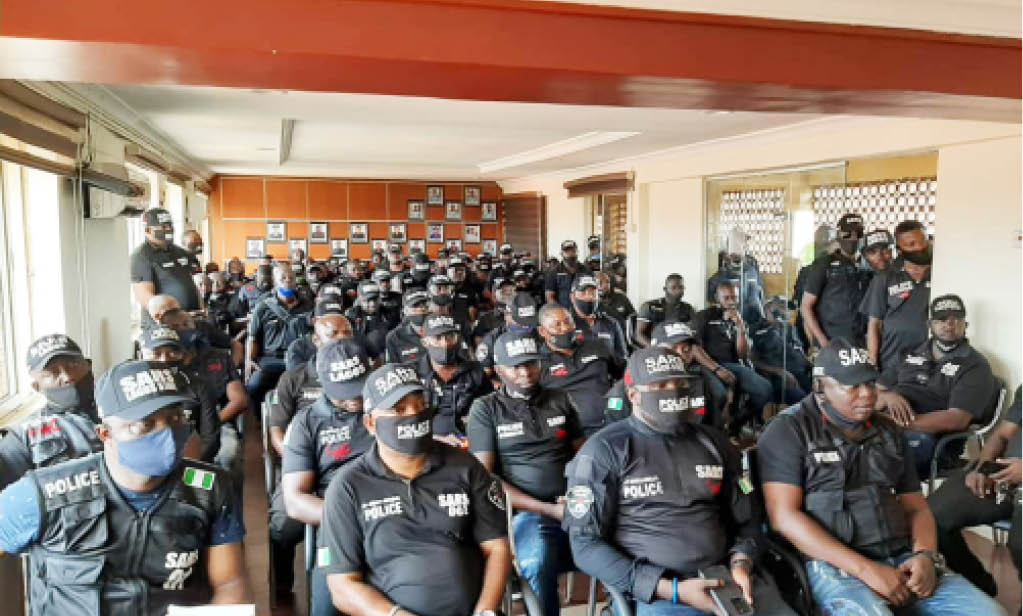SARS is in the limelight yet again, and for all the wrong reasons: allegations of illegal profiling, extortion and extrajudicial killings.
The latest furore was triggered by the squad’s checkpoints where they stop young Nigerians going about their normal businesses in cities and search their laptops and phones in the name of investigating cybercrimes. Those found “guilty” of using expensive gadgets, carrying cash, or driving flashy cars are arrested and extorted. In the course of this, they allegedly killed a young man last Saturday in Lagos.
On social media, the hashtag #EndSARSNow, first used years ago, was revived. After days of condemnation and campaign, the Inspector General of Police (IG), Mohammed Adamu announced a ban on stop and search duties and “invasion of privacy of citizens particularly through indiscriminate and unauthorised search of mobiles, laptops and smart devices”. This policy was applauded by the Governors’ Forum and Vice President Yemi Osinbajo, who said he was “very angry” and President Buhari is “very concerned” with the “unlawful and illegal” activities of the “bad eggs” in the police force.
Without wishing to spoil the relief at this development, I found the IG’s statement to be hollow. We may not be able to see the future, but we can look at the recent past for clarity. This is the fourth time within the past four years that the police have made similar announcements. At every SARS scandal, police headquarters have pledged investigation or reform. Then, nothing happens, and as the uproar fades, SARS carries on. In August 2018, the government even set up a judicial commission of inquiry to investigate the activities of SARS and make recommendations for reform. But the “reform” ended with the submission of the committee’s report. No one was held accountable, nothing substantive was done, nor was the report made public.
But SARS’s illegalities go far beyond the human rights abuses we read on social media. They and other police officers habitually meddle in issues that are clearly outside the remit of the police, much less its anti-robbery squad. As a lawyer, I’ve handled numerous cases in which SARS officers acted as debt collectors, commercial contract enforcers or marriage dissolvers for persons that paid them, or are connected to them. And the culprits are not a few “bad eggs” within their ranks but include officers in the topmost echelon of the unit.
In 2013, I prosecuted a civil suit against SARS officers, including the officer-in-charge of Kano State, for the horrific torture of two brothers, Hassan and Auwalu Abdullahi Alfa, who were reported by their relative following a domestic dispute. Auwalu survived, but Hassan died from his injuries days after SARS released him. The Federal High Court found that Hassan died as a result of the beating he received at the hands of SARS, which the judge held was “unlawful, barbaric and illegal” and ordered IG to “do something about it.” The court further ordered the police and the culprits to publicly apologise to the family and pay them the sum of ten million naira as compensation.
Six years after the judgement, no apology has been received, the compensation hasn’t been paid, and no one has been prosecuted. In fact, the next thing I heard was that the officer-in-charge of SARS on the day Hassan was tortured, who was personally involved in the torture, was named on the court processes and against whom judgement was given, had been promoted from Kano to become the national head of SARS at the headquarters in Abuja. Today, he is one of Nigeria’s most senior police officers, in the inner circle of the IG and overseeing one of the squads involved in these outrageous abuses. What message does this send to police officers and Nigerians?
Even without these abuses, SARS has run its course. It was set up to fight armed robbery in its heyday. With the advancement of mobile banking, this kind of violent crime has morphed to new forms like kidnap-for-ransom and cattle rustling. Offenders mostly live in the forest and operate in remote areas and on highways. SARS should be completely disbanded, and its men and resources moved to the Anti-Kidnapping and Special Tactical squads both of which should be dispatched to the forests that have become dens of organised crimes and terrorism.
But even disbanding SARS is not enough. The palpable failure of our policing system is clear as day. The alarming levels of crimes in our country, for which no one is held accountable, is the best indication that the police have failed in its statutory duties of prevention and detection of crimes, investigation, and prosecution of offenders and protection of lives and property. It is because of this failure that the army has taken over keeping law and order in most of the country while wealthy Nigerians have resorted to relying on private security. Ordinary Nigerians have taken to vigilantism in self-defence, and jungle justice is becoming the order of the day especially in rural areas. Kidnappings and killings have become so commonplace that we’ve become desensitised, and ethno-religious violence and ritual killings continue. This slide into anarchy cannot be allowed to continue unabated.
Our policing system requires holistic reform. We’ve got to build capacity, tackle impunity and eliminate corruption from the police force. We need to upgrade the moral and educational standing of police officers through continuing education and training, and improved transparency and accountability. Police officers must be made to realise and accept that they are not above the laws that created them and for which Nigerians treat them with deference. The police cannot be allowed to continue to be the arbiter in complaints against them. An independent office for police conduct should be established under the National Human Rights Commission or another appropriate agency to establish standards and investigate serious complaints against police personnel. We can’t fight cybercrimes by searching smart devices on the road. Community-based, smart policing and intelligence-led, tech-driven approaches must replace ancient methods of preventing and fighting crime.

 Join Daily Trust WhatsApp Community For Quick Access To News and Happenings Around You.
Join Daily Trust WhatsApp Community For Quick Access To News and Happenings Around You.


